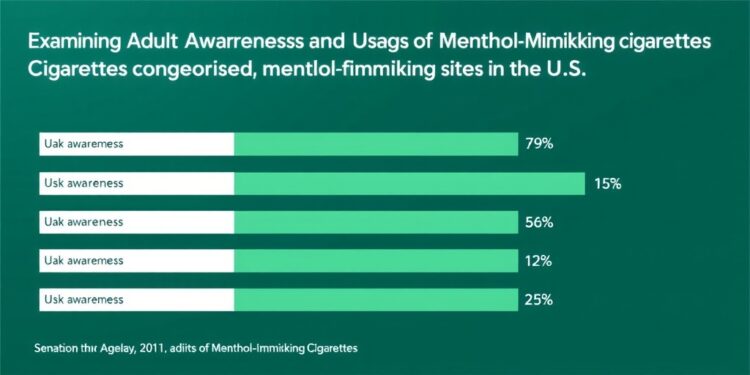
In a revealing new study published in the renowned JAMA Network Open, researchers have illuminated a growing public health concern regarding synthetic cooling agents utilized in menthol-mimicking cigarettes. This investigation, which surveyed a considerable number of U.S. adults, highlights the increasing awareness and experimentation with these products. As a consequence, they may undermine the public health advantages intended by legislations aimed at banning traditional menthol cigarettes. The implications of this research extend far beyond the raw statistics; they provoke critical discussions about the effectiveness of smoking cessation strategies in the context of evolving tobacco products.
Menthol cigarettes have been a particular topic of focus in public health discussions due to their appeal, especially among young smokers and vulnerable populations, including racial minorities. The flavoring has been shown to facilitate smoking initiation and make quitting significantly more challenging. To combat this, various public health authorities and lawmakers have considered bans on menthol cigarettes. However, the increasing popularity of menthol-mimicking cigarettes complicates this landscape and could potentially thwart efforts aimed at smoking cessation.
As part of the study, participants reported their levels of awareness regarding synthetic cooling agents designed to replicate menthol’s cooling effect without incorporating actual menthol. Interestingly, a notable percentage of respondents confirmed that they had tried these products. This suggests that the market is adapting quickly and that consumers are shifting towards alternatives rather than entirely abandoning tobacco use. This raises alarm bells for public health advocates who aim to reduce smoking rates throughout the population, particularly among demographics heavily targeted by tobacco marketing strategies.
The study’s authors argue that while smoking cessation initiatives are essential, they must consider the emergence of synthetic alternatives. Without addressing these newly popularized products, there is a risk that intended health benefits from banning menthol cigarettes may be rendered ineffective. The situation underscores a broader trend that has emerged in tobacco control: when traditional products are restricted or made less accessible, alternative forms often spring up to fill the void. This pattern emphasizes the necessity for comprehensive tobacco regulation beyond mere product bans to include substitutes and emerging variants.
Moreover, the study’s findings highlight an urgent need for increased educational campaigns aimed at smokers and potential users about the risks associated with menthol-mimicking products. Many users might perceive these substitutes as safer options due to their branding and marketing tactics. Emphasizing that these cigarettes can still lead to addiction and other health-related issues is paramount for supporting public health objectives.
The researchers advocate for a more profound exploration into the long-term impacts of using these synthetic cooling agents. An extensive evaluation could provide insights regarding their implications on smoking habits, cessation rates, and overall health outcomes. Future studies should thus focus on understanding not just the prevalence of use among various demographics, but also the qualitative experiences and attitudes towards these products.
With the U.S. Food and Drug Administration’s (FDA) ongoing efforts to regulate tobacco products, the findings from this study serve as a timely reminder of the dynamic nature of the tobacco landscape. Regulatory bodies may need to take swift action to anticipate the rise of similar alternative products that could undermine previous successes in tobacco control efforts. Continuous monitoring and adapting guidelines according to emerging evidence will be critical in maintaining the integrity of public health initiatives.
Additionally, the consumer market for synthetic cooling agents will likely keep evolving as manufacturers seek to capitalize on shifting preferences. Therefore, it becomes crucial for health professionals and policymakers to collaborate with researchers to identify emerging trends and address them proactively. Developing frameworks for assessing the impact of these products will empower public health efforts and protect vulnerable populations from being lured into a false sense of safety regarding tobacco use.
The study’s articulate articulation of the emerging challenges posed by synthetic cooling agents adds a vital layer to the ongoing conversation about smoking cessation and product regulation. The implications of the research not only pertain to public health but also signal a necessity for interdisciplinary collaboration to tackle complex health issues generated by tobacco usage in its many forms. By establishing effective communication channels among research experts, policymakers, and communities, a more robust tobacco control strategy can evolve.
Ultimately, this study raises critical questions about the future pathways for tobacco control in the U.S. As synthetic cooling agents gain traction, stakeholders must remain vigilant. The sustainable success of smoking cessation initiatives hinges on this awareness and adaptability to the rapidly changing landscape of tobacco products. In conclusion, a multifaceted approach that encompasses regulation, education, and research will be essential in striving towards a smoke-free society.
Subject of Research: Awareness and experimentation with synthetic cooling agents in menthol-mimicking cigarettes among U.S. adults
Article Title: New Study Sheds Light on the Rise of Synthetic Cooling Agents in Menthol Cigarettes
News Publication Date: October 30, 2023
Web References: Not available
References: Not available
Image Credits: Not available
Keywords: menthol cigarettes, synthetic cooling agents, smoking cessation, public health, tobacco regulation, U.S. adults, health outcomes, tobacco control strategy





